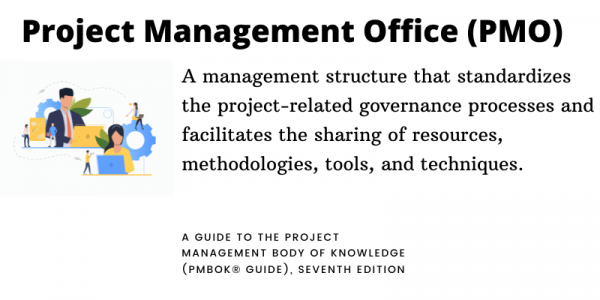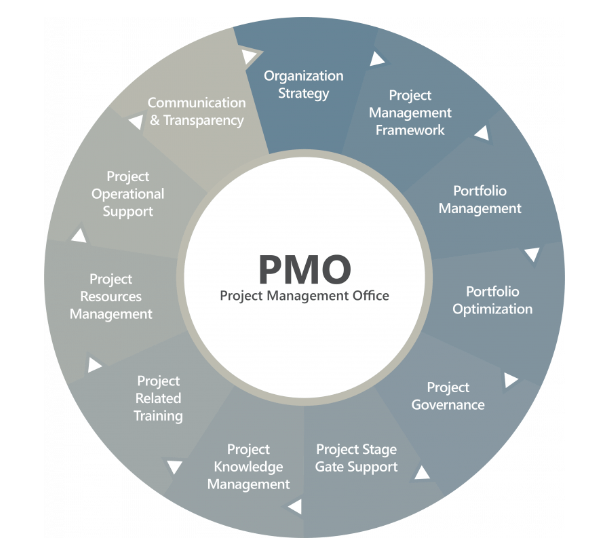The Project Management Office, or PMO, is a group within an organization that provides support and guidance to project managers. It is responsible for ensuring that projects are completed on time, within budget, and according to the organization’s standards.
Its size and structure depend on the organization’s needs and can be a centralized or decentralized unit within the organization, and it can be staffed with full-time employees or part-time consultants.
In project management, a PMO (project management office) is a department within a company that provides centralized project management services and is responsible for the overall success or failure of projects, and for ensuring that project management best practices are followed. Despite its importance, the PMO is often misunderstood, and its value is not always recognized.
What Does PMO Mean?
It has several important functions, including project portfolio management, resource management, project planning and scheduling, risks and issues management, and change management. It can also provide project management training and support to project managers and other project stakeholders and plays a vital role in the successful delivery of projects, and its importance should not be underestimated.
If your organization is looking for ways to improve its project management capabilities, you should consider implementing a PMO.

PMO Role and Responsibilities
The roles and responsibilities of the PMO vary depending on the size and scope of the organization. However, some of the most common responsibilities of the PMO include:
- Project portfolio management
- Project management support
- Project governance
- Manage shared resources
Generally speaking, a PMO is responsible for providing governance and support for project managers and teams.
This can include things like developing project management standards, maintaining a repository of project documentation, and providing training and mentoring for project managers. In larger organizations, it may also be responsible for managing enterprise-wide projects or program portfolios.
The roles and responsibilities are often governed by organizational policies and procedures. As such, they can vary from one organization to the next. However, in most cases, the PMO plays an important role in ensuring that projects are managed effectively and efficiently.
A PMO can provide a variety of services to an organization, but the most common service is project management consultation. In this role, the PMO works with project teams to provide guidance and assistance with project management best practices. The goal of this consultation is to help project teams improve their performance and deliver better results.
Other common services provided by a PMO include project management training, providing project templates and processes, and maintaining a project management software tool. By standardizing processes and providing templates, the PMO can help project teams save time and increase efficiency.

Who Should Staff A PMO?
So far we know that a PMO is responsible for ensuring that the project stays on track and meets its goals. But who exactly staffs the PMO?
The answer to this question depends on the size and scope of the project.
Its size and structure vary from organization to organization. Some organizations have a large PMO that staffs many project managers, while others have a small PMO with only a few project managers. Some PMOs are part of the executive team, while others report to the CEO.
For small projects, the PMO may be staffed by a single project manager. For larger projects, the PMO may be staffed by a team of project managers, project coordinators, and other project-related personnel.
In any case, the PMO is an essential part of any project management team. Without the PMO, it would be very difficult to keep track of all the moving parts of a project and ensure that the project stays on track.
The right mix of skills, experience, and knowledge is necessary to ensure that the PMO is able to effectively support the project management team.
The most common staff positions within a PMO include project coordinators, project controllers, project managers, and business analysts. Each of these positions has a specific set of responsibilities that contribute to the overall success of the PMO.
PMO Types
Each type of PMO has its own unique set of responsibilities and functions, but all PMOs share the goal of supporting and improving the project management process within their organization.
If your organization is considering starting a PMO, or you are a project manager who will be working with a PMO, it is important to understand the functions of the PMO and how it can help you achieve success. The PMO can take on different forms, depending on the needs of the company.
The three most common types of PMO are the supportive PMO, the controlling PMO, and the directive PMO.
Supportive PMO
The supportive PMO provides resources and assistance to project managers but does not dictate how they should run their projects and they do not get involved in the day-to-day management of projects. Their main focus is on helping project managers to be successful.
This type of PMO is focused on providing help and guidance to project managers. They may provide templates, best practices, and advice on how to run projects successfully.
Controlling PMO
The controlling PMO oversees and reviews all project management processes to ensure they are being followed correctly. This is focused on ensuring that projects stay on track and within budget.
They are more hands-on than the supportive PMO, and they may have the authority to make decisions about projects. They may do this by monitoring project progress, conducting audits, and reporting to upper management.
Directive PMO
The directive PMO is focused on controlling every aspect of the project management process. This directive is more responsible for monitoring and reporting on their progress as they are the most hands-on of all by giving project managers and teams specific directives to follow. They may do this by setting deadlines, making decisions, and allocating resources.
PMO Functions
There are several different Functions of PMOs (project management offices) that can be employed in project management.
Here are a few of the most common functions applied by PMOs:
- Strategic PMO
This is responsible for aligning projects with the organization’s strategic goals.
They work with senior leaders to ensure that the project management strategy aligns with the overall business strategy.
- Portfolio PMO
This function of PMO manages a portfolio of projects and ensures that they are all progressing according to plan. They work with project managers to ensure that projects are delivered on time, within budget, and to the required quality standards.
- Program PMO
This function of PMO oversees programs and multiple projects that are all related to each other.
- Project Management Methodology (PMM) PMO
This function of PMO oversees the project management methodology used by the organization.
- Enterprise PMO
This function is responsible for managing all aspects of the project management lifecycle for all projects within the organization.
Why PMO Matters?
Without a PMO, it would be very difficult to manage a project effectively as it ensures that all of the necessary pieces are in place so that the project can be completed successfully.
That is why the PMO is an important part of project management because it provides a centralized point of control for all projects.
This can help to ensure that projects are completed on time, within budget, and to the desired quality standards. For example, a PMO can help to improve communication and collaboration among project stakeholders.
As this can play a critical role in the success of projects, but it is important to understand the PMO’s role in relation to other parts of the organization.
The PMO is not a replacement for the project manager, but rather a support system that can help the project manager be more successful.
If you’re looking to set up a PMO in your organization, there are a few things you should keep in mind.
Benefits of Project Management Office
If you’re looking to set up a PMO in your organization, there are a few things you should keep in mind.
A PMO, or Project Management Office, is a vital part of any project manager’s toolkit. As it can help with everything from resource allocation to project tracking and reporting.
There are many benefits that can be gained from implementing a PMO within an organization.
Some of the most significant benefits can include for example improved project success rates, higher levels of customer satisfaction, and reduced costs.
A PMO can provide a number of benefits to project managers, including:
- Improved project visibility and transparency,
- Better project tracking and reporting with improved project success rates
- Reduced project risks
- Improved project coordination and communication between project managers
- Increased project efficiency of resources
These are just a few of the many benefits that a PMO can provide. If you’re considering implementing a PMO in your organization, be sure to weigh the benefits against the costs to see if it’s the right decision for your business.
The future of PMOs: What’s next
The role of the Project Management Office (PMO) is evolving. As organizations face new challenges in the ever-changing landscape of business, the PMO must adapt to stay relevant. To understand the future of the PMO, we must first understand the challenges it faces. One of the biggest challenges for the PMO is to keep up with the rapidly changing business landscape.
Technology is constantly evolving, and organizations must adopt new tools and processes to stay competitive. The PMO must be able to quickly adapt to these changes and help the organization keep up with the competition.
While some believe that the role of PMO will become increasingly important in the coming years, others believe that the office will be phased out entirely. The truth is, it is difficult to say what the future will hold for the PMO.
There are a number of factors that could influence the future of PMO.
One such factor is the increasing use of artificial intelligence (AI) in project management. AI-powered project management tools have the potential to automate many of the tasks that PMO currently performs. This could lead to a reduction in the need for PMO, or at least a change in the role that PMO plays in project management. With the right strategies in place, the PMO can overcome these challenges and continue to play a vitalthe role in the success of organizations.
FAQs
What are three types of PMO?
The three types of PMO are the supportive PMO, the controlling PMO, and the directive PMO. Each type of PMO has its own unique purpose and function.
Why does PMO matter?
A PMO, or Project Management Office, can be a great asset for project managers. For example, a PMO can provide support, resources, and advice to project managers, helping them to successfully complete their projects.
What are the main benefits of a PMO?
A PMO can offer many benefits to an organization, including improved project management processes, standardized tools and templates, and increased efficiency. Additionally, a PMO can help to improve communication and coordination between different departments within a company.
What are the functions of a PMO?
The main functions of PMO are aligning projects with the organization’s strategic goals, managing a portfolio of projects and ensuring that they are all progressing according to plan, overseeing programs and multiple projects, managing shared resources, and conducting audits.
What is the key responsibility of a PMO?
They may include providing support to project managers, developing project management processes and templates, and training project managers on best practices. A PMO can also be responsible for tracking project milestones and ensuring that the project is on track.
